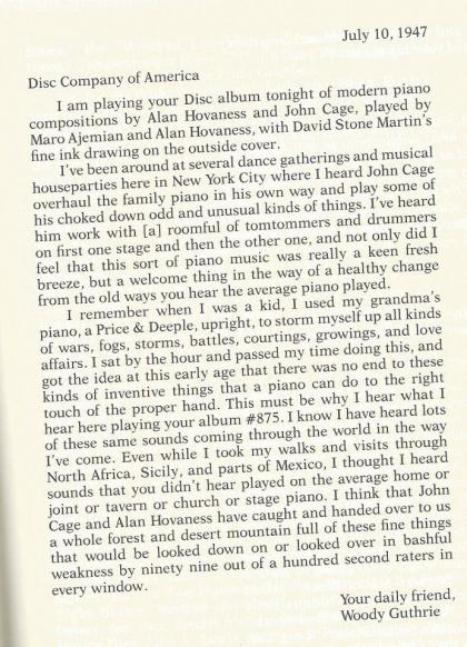I’ve always felt a certain close affinity with Woody Guthrie. Could be my admiration for his unstinting working-man’s politics or that he hails from my mother’s home state of Oklahoma. Those are strong appeals, and I suppose it’s all of that and more: Guthrie could carve out compact granite sentences even Robert Frost would envy. If the letter above doesn’t convince you, read the man’s autobiography. In the letter, the unapologetic working-class folksinging Okie who embodied depression-era authenticity writes to “Disc Company of America” to enthuse over John Cage for his “overhaul of the family piano” and his “choked down odd and unusual kinds of things.”
Odd and unusual are two words that spring to mind when imagining Guthrie writing a letter in praise of Cage. (He also praises Armenian composer Alan Hovhaness—Guthrie spells it “Hovaness”). Written in 1947, it is the kind of text one wants to quote in its entirety. Fortunately, we have the reproduction above, and you can read it for yourself. What isn’t reproduced is the postscript, in which Guthrie wrote: “I need something like this oddstriking music to match the things I feel in my soul tonight.” He also wrote that that morning, his wife, Marjorie, had “given birth to a big 7‑pound boy”—Arlo.
Guthrie’s letter references a (now extremely rare) two-disc set entitled Piano Compositions by Alan Hovhaness and John Cage played by Maro Ajemian and Alan Hovhanes, featuring a hand-drawn cover by acclaimed jazz-record illustrator David Stone Martin. According to LA Times music critic Mark Swed, the Cage composition on Guthrie’s 78-rpm record was the prepared piano solos from Cage’s Amores, composed in 1943. Below, watch a performance of the “oddstriking” Amores by Spanish ensemble Neopercusión.
Thanks to Tristan for pointing us to this letter originally blogged over at Stool Pigeon.
Josh Jones is a doctoral candidate in English at Fordham University and a co-founder and former managing editor of Guernica / A Magazine of Arts and Politics.



This is great and your research is amazing!
This amazing two-disc set changed my life. My father bought it for me ca. 1951 (I was 6) and I loved it right away. Contents are: Disc 1–Hovhaness Mihr, Part I; Mihr, Part II; Disc 2–Cage: Amores I & IV; Hovhaness Invocations to Vahakn, IV & V. Producer was George Avakian who had to sign his name in the Armenian alphabet since he was under contract to Columbia Records.
Wonderful!
Guthrie stayed at Topanga Canyon in L.A. with Will Greer & Harry Hay.
Hay was a friend of Cage, and helped produce Cage’s first concert at the Santa Monica Women’s Club.
Wow, how amazing! Beautiful piece of research and revealing.
Thank you for this post full of grace–Guthrie’s letter, your background info, and Cage’s beautiful Amores. I wish Hovahnes’s Mihr could have also been embedded.
This is a great post. So exciting to read and think about the forever noble and great Woody.
Wasn’t Harry Hay one of the first Gay Rights advocates way back when? Woody really met everyone,
we sure could use him right about now.
Even more so now eh? But clearly, reading the above, and knowing so many feel the same, Woody IS here now. We need to use ourselves, somehow, to keep his/our spirit alive and going out from us into the world.
Thanks so much for this great post. I know very little of Woody Guthrie and had no idea that he had such amazing taste in music. Wonderful!
It’s worth pointing out that the Disc Record Co. Woody refers in the letter is one of the two labels Moses Asch ran before he started Folkways Records, Woody made a lot of recordings for Moses Asch (which have subsequently been issued on Folkways and its successor, Smithsonian/Folkways). So it’s all a big family story.
Asch was conscious that he was helping create the avant garde in music. He recorded Cage, as well as Guthrie, Lead Belly and Pete Seeger, and some of the first records of electronic music.
It’s also worth remembering that in the 1940s and 1950s, folk music was regarded as very avant garde. (John Cohen has written about this,) In 1956 Jean Ritchie put out “Carols for All Seasons”, and it featured (along with Ritchie’s voice and mountain dulcimer, someinstruments that were also considered avant garde at the time, like the harpsichord. Yes, really; the harpsichord was avant-garde- esoteric in the 1950s, as was that weird long-hair stuff, baroque music.